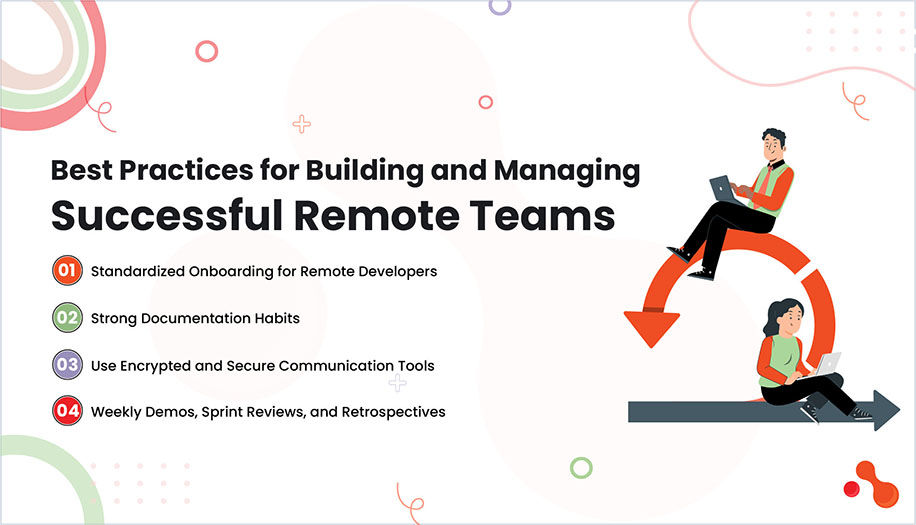Benefits of Remote Development Teams for Startups in 2025
Learn why remote development teams are reshaping software project success in 2025. Discover key benefits, challenges, and best practices for global collaboration.
Introduction
In 2025, startups and enterprises seeking to scale quickly are increasingly opting to hire dedicated developers, remote developers, or both, rather than investing heavily in traditional in-house teams. This shift is largely driven by the growing success of remote development teams, which offer faster onboarding, reduced costs, and easier access to global tech talent.
The acceptance of distributed workforces has expanded significantly. Startups can now build remote development teams with the right skills, time zone coverage, and proven workflows. Improved internet infrastructure, better team management tools, and mature hiring platforms have made it easier than ever to work with dedicated remote professionals.
This blog outlines the benefits of remote development teams and how they empower startups in 2025. You will also get to know the remote team advantages that support faster product delivery, operational flexibility, and smarter hiring strategies!
What Are Remote Development Teams?

Remote development teams are groups of software engineers, designers, testers, and technical leads who collaborate on projects while working from different physical locations. These teams function independently of the client’s on-site office and are often distributed across cities or even countries.
There are two common types of remote teams used by startups:
Fully Remote Teams:
All members work remotely, often across time zones. These teams are common in early-stage startups looking to reduce overhead and access diverse global talent.
Hybrid Remote Teams:
Some members work on-site while others contribute remotely. This model enables internal leadership to maintain oversight while expanding development capabilities through remote contributors.
Hire Dedicated Remote Developers with Acquaint Softtech!
Need Laravel, MERN, or DevOps experts for your next sprint or MVP launch? Acquaint Softtech helps startups hire dedicated remote developers in under 48 hours. Get pre-vetted, project-ready talent without the delays of traditional hiring.
Key Benefits of Remote Development Teams
Startups working with remote development teams gain operational and strategic advantages that directly support product speed, cost control, and scaling flexibility. Below are the core benefits driving their adoption in 2025!
Access to Global Talent
Startups are no longer limited by local hiring constraints. With a distributed hiring model, they can access experienced developers from global talent hubs like India, Eastern Europe, and Southeast Asia.
According to the 2025 Developer Hiring Trends Report, access to a global talent pool can reduce hiring timelines by 35%, helping startups launch faster and fill technical gaps more efficiently.
Cost Efficiency Without Compromising Quality
Remote teams offer significant cost advantages without lowering engineering standards. By hiring from regions with lower living costs, startups can maintain high development quality while reducing salary expenses.
Here’s a quick comparison of average monthly salaries (USD) for mid-level developers:
Region | Laravel Developer | MERN Stack Developer | DevOps Engineer |
United States | $8,500 | $9,200 | $9,800 |
Western Europe | $6,800 | $7,200 | $7,900 |
India | $2,200 | $2,500 | $2,800 |
In addition to salaries, startups that hire dedicated developers remotely save on office space, hardware, employee benefits, and admin overhead.
Faster Project Delivery Cycles
With team members working across different time zones, startups can benefit from near-continuous progress. When managed properly, this setup allows for faster feedback loops and reduced downtime between sprints.
Remote squads often adopt agile sprints with overlapping handoff windows to accelerate delivery. This enables product teams to roll out new features, patches, and iterations at a much faster pace compared to traditional setups.
Enhanced Flexibility and Scalability
One of the most valued benefits of remote development teams is the ability to scale team size based on project needs. Whether launching a new product, entering a sprint-heavy development phase, or handling a seasonal load spike, startups can adjust quickly.
Challenges You Must Address When Managing Remote Teams
While remote development teams offer clear advantages, startups must address specific operational risks to ensure success. Miscommunication, weak management frameworks, and security gaps can disrupt momentum if not handled early. Founders who invest in structure, transparency, and secure practices get the most value from their remote teams.
Miscommunication Across Time Zones
One of the most common issues in remote setups is poor communication. Without shared office hours, teams may miss context, delay decisions, or misinterpret priorities.
Smart Solutions:
Set core overlapping hours for key meetings across all time zones.
Use async tools like Loom or Slack huddles for short updates and blockers.
Document everything from sprint goals to design notes in shared workspaces like Notion or Confluence.
Encourage regular updates, even for small changes, to maintain alignment.
Lack of Structured Project Management
Remote teams without a defined workflow often drift or lose clarity on sprint objectives. This results in missed deadlines, inconsistent output, and rework. In startups where every sprint matters, structure is non-negotiable. When building remote development teams, they must operate with the same discipline as an in-house squad.
Smart Solutions:
Use agile project management tools like Jira, ClickUp, or Linear.
Break projects into 1–2 week sprints with fixed deliverables and review points.
Assign sprint owners or tech leads to keep accountability clear.
Hold weekly demos or reviews to track velocity and resolve issues early.
Security and IP Protection
Distributing your development workforce across regions introduces new risks around access, compliance, and code safety. Startups handling sensitive data or proprietary systems must guard against leaks, misuse, or accidental exposure.
Smart Solutions:
Set up RBAC (Role-Based Access Control) for Git, CI/CD pipelines, and staging environments.
Use version control systems like GitHub or GitLab with enforced access logs.
Store credentials in secret management tools (Vault, AWS Secrets Manager) rather than spreadsheets.
Communicate using end-to-end encrypted tools and require secure workstation setups.
Ensure every hire dedicated remote developer signs NDAs and works within isolated environments.
Cultural Disconnect and Engagement Drop
Remote developers may feel disconnected from the core product vision, team rituals, or company mission. This impacts morale, ownership, and retention over time.
Smart Solutions:
Share context regularly, not just task lists and make sure developers understand the “why” behind what they’re building.
Include remote team members in all-hands meetings, team retrospectives, and internal planning sessions.
Celebrate wins across time zones using async tools and team rituals.
Provide growth paths and visibility to remote contributors.
Proactively solving these challenges is essential to getting the full value from remote development teams. With the right systems in place, remote collaboration becomes a competitive advantage, not a compromise.
Best Practices for Building and Managing Successful Remote Teams

Startups that succeed with remote development teams do more than just assign tasks. They build clear systems around onboarding, documentation, security, and feedback. These practices reduce friction, improve velocity, and keep distributed teams aligned with product goals.
Standardized Onboarding for Remote Developers
Remote contributors must be able to start quickly with full clarity on tools, workflows, and expectations. Without a structured onboarding process, early confusion can slow down momentum or cause misalignment.
Best Practice:
Create an onboarding kit with access instructions, tool stack guides, coding standards, and sprint structure.
Assign a technical lead or onboarding buddy for the first 1–2 sprints.
Share a clear roadmap, team roles, and a communication flow from day one.
A strong start leads to faster productivity and better code integration.
Strong Documentation Habits
In remote settings, documentation replaces hallway conversations. Startups that build remote development teams need to document workflows, logic, and decisions to reduce back-and-forth and improve consistency.
Best Practice:
Maintain a central knowledge base using tools like Notion, Confluence, or GitHub Wiki.
Standardize documentation for features, deployments, and sprint retrospectives.
Encourage developers to update SOPs, API references, and process flows as part of their sprint deliverables.
When documentation is part of the process, not an afterthought, it strengthens autonomy and quality.
Use Encrypted and Secure Communication Tools
Data safety is critical, especially when teams are distributed across borders. From sharing credentials to discussing system architecture, all communication should be secured.
Best Practice:
Use end-to-end encrypted tools like Signal, ProtonMail, or secured Slack channels for sensitive communication.
Avoid using public chat apps or unencrypted file-sharing tools.
For code, use Git repositories with branch protection, access logs, and audit trails.
Trust is built by securing access and tracking activity without slowing down the team.
Weekly Demos, Sprint Reviews, and Retrospectives
Visibility and feedback cycles are critical in remote teams. Without regular demos and reviews, developers may lose sight of product impact or deviate from planned outcomes.
Best Practice:
Hold weekly sprint reviews to demo what was shipped, gather feedback, and discuss blockers.
Run retrospectives to identify what worked and what needs adjustment in the next cycle.
Use async tools like Loom or Miro when teams cannot join live.
How Startups and Growing Businesses Benefit Most from Remote Development?
.jpg)
For startups and early-growth companies, every decision around hiring, delivery, and resourcing impacts speed and sustainability. Remote development teams provide direct advantages that support rapid execution and capital efficiency.
Speed to MVP
Startups need to validate ideas quickly to stay ahead of the curve. Remote teams make it possible to hire dedicated developers fast and begin execution without the delays that often come with local recruitment cycles. With well-structured sprint planning and asynchronous collaboration, product teams can align on goals, iterate faster, and ship MVPs in weeks rather than months. This approach to MVP development not only speeds up time-to-market but also helps gather early user feedback to shape product direction efficiently.
Early User Feedback Loops
By delivering product iterations faster, startups get actionable feedback from real users sooner. Remote squads working across time zones can support continuous updates, bug fixes, and onboarding improvements.
Faster Investor Readiness
Startups that launch early and iterate quickly show progress to investors with working demos and live user data. A lean remote development team makes this possible without hiring a full internal department, allowing the founding team to focus on fundraising with a functioning product.
Higher Financial Runway Preservation
Hiring a local team full-time adds long-term costs that many startups cannot afford in early stages. By working with dedicated remote developers, companies can reduce overhead while maintaining delivery speed. This improves runway visibility and makes cash allocation more strategic.
Build a Scalable Remote Development Team with Acquaint Softtech!
Whether you're building an MVP or scaling an existing platform, Acquaint Softtech offers flexible remote development teams tailored to your product goals. Save time, reduce costs, and get expert delivery from day one.
Bottomline
Remote development teams have evolved far beyond a cost-saving tactic. In 2025, they represent a strategic way for startups to scale faster, access specialized talent, and compete on a global level. From speeding up MVP delivery to preserving runway and accelerating investor readiness, the benefits are practical and measurable.
To stay competitive, founders must think beyond local hiring limitations. The ability to hire dedicated remote developers quickly and integrate them into agile workflows is now a core advantage. Startups that embrace this model are better positioned to move faster, adapt smarter, and build stronger products from day one!
Table of Contents
Get Started with Acquaint Softtech
- 13+ Years Delivering Software Excellence
- 1300+ Projects Delivered With Precision
- Official Laravel & Laravel News Partner
- Official Statamic Partner
